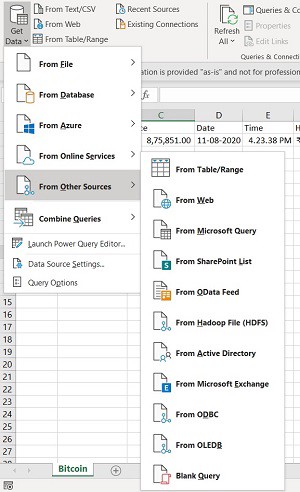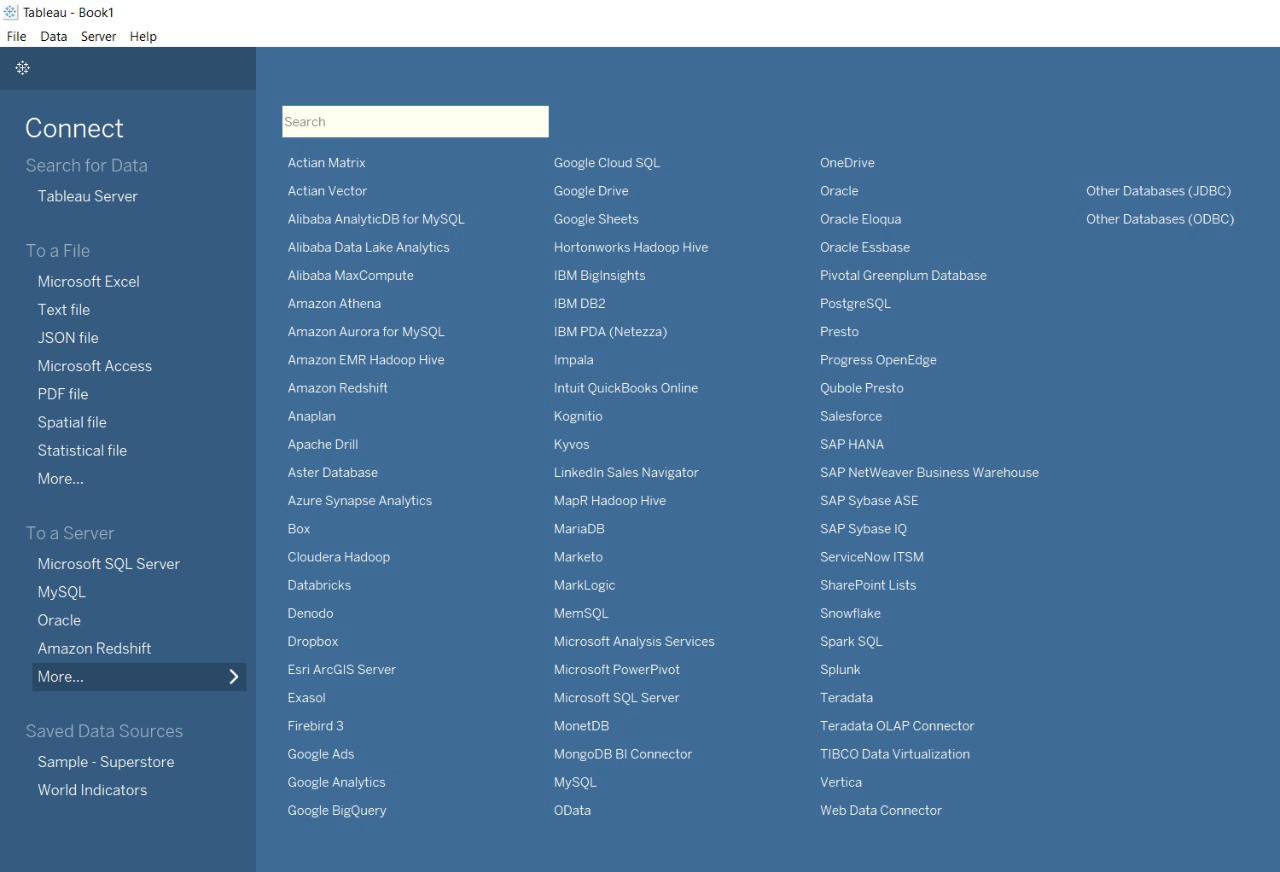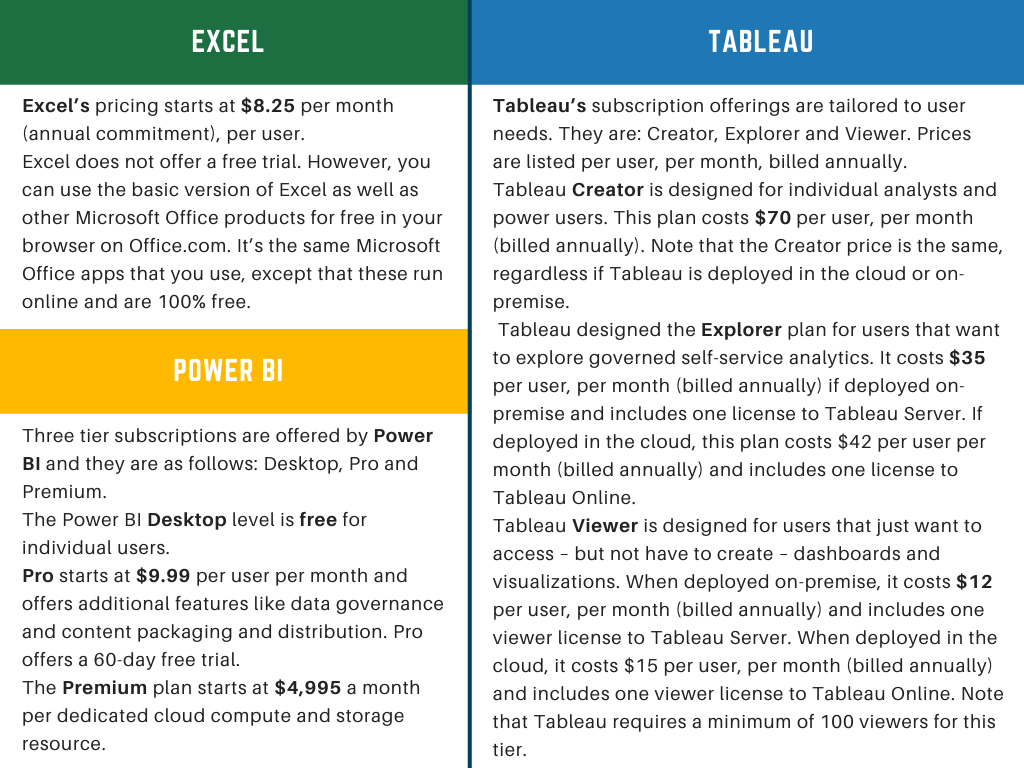tableau大屏bi
After publishing my previous article on data visualization with Power BI, I received quite a few questions about the abilities of Power BI as opposed to those of Tableau or Excel. Data, when used correctly, can turn into digital gold. So what must you, as an individual or organization, use to analyze and visualize your data? Keep reading to find out.
在發布了我之前有關使用Power BI進行數據可視化的文章之后,我收到了很多有關Power BI與Tableau或Excel的功能有關的問題。 正確使用數據后,數據可能會變成數字黃金。 那么,作為個人或組織,您必須使用什么來分析和可視化數據? 繼續閱讀以找出答案。
In this article, we shall understand all three systems and compare their various features.
在本文中,我們將了解所有三個系統并比較它們的各種功能。
Microsoft Excel was released in the year 1985 and essentially is a tool that has features like calculation, graphing tools, pivot tables, and a macros programming language. It can be used on several operating systems such as Windows, Mac, Android, iOS, etc.
Microsoft Excel于1985年發布,本質上是一種具有計算,繪圖工具,數據透視表和宏編程語言等功能的工具。 它可以在Windows,Mac,Android,iOS等多種操作系統上使用。
Next came Tableau. Founded in 2003, Tableau is an interactive data visualization software. It is recognized as the fastest growing data visualization tool mainly because of its ability to help users see and understand data. It simply converts raw data into a comprehensible visual that transforms the way people use data for problem solving and decision making.
接下來是Tableau。 Tableau成立于2003年,是一種交互式數據可視化軟件。 它被公認為增長最快的數據可視化工具,主要是因為它能夠幫助用戶查看和理解數據。 它只是將原始數據轉換為易于理解的視覺效果,從而改變人們使用數據進行問題解決和決策的方式。
Power BI was released in 2014. It is a cloud-based analytics and business intelligence service by Microsoft. It aims to provide interactive visualizations and business intelligence capabilities along with simple data sharing, evaluation of data and scalable dashboards to it’s users.
Power BI于2014年發布。它是Microsoft提供的基于云的分析和商業智能服務。 它旨在為用戶提供交互式的可視化和商業智能功能,以及簡單的數據共享,數據評估和可擴展的儀表板。
Let’s list out a few parameters and compare all three softwares.
讓我們列出一些參數并比較所有三個軟件。

1.數據來源 (1. Data Sources)
Excel, being a flexible, easy-to-use spreadsheet, is often used to create datasets. It can pull data from external data sources into your spreadsheet with the help of data connection features. It can also obtain data from sources such as the Web, Microsoft Query, SharePoint List, OData Feed, Hadoop Files (HDFS) etc. Consequently, Excel files are often used as a data source for Power BI and Tableau.
Excel是一種靈活,易于使用的電子表格,通常用于創建數據集。 它可以借助數據連接功能將外部數據源中的數據提取到電子表格中。 它還可以從Web,Microsoft Query,SharePoint列表,OData Feed,Hadoop文件(HDFS)等來源獲取數據。因此,Excel文件通常用作Power BI和Tableau的數據源。
Tableau offers support for hundreds of data connectors including online analytical processing (OLAP) and big data options (such as NoSQL, Hadoop) as well as cloud options.
Tableau支持數百種數據連接器,包括聯機分析處理(OLAP)和大數據選件(例如NoSQL,Hadoop)以及云選件。

Power BI is very capable of connecting to a users’ external sources including SAP HANA, JSON, MySQL, and more. It enables users to connect to Microsoft Azure databases, third-party databases, files and online services like Salesforce and Google Analytics.
Power BI非常有能力連接到用戶的外部資源,包括SAP HANA,JSON,MySQL等。 它使用戶可以連接到Microsoft Azure數據庫,第三方數據庫,文件和在線服務,例如Salesforce和Google Analytics。
When users add data from multiple sources, Tableau and Power BI determine the relationships automatically. However, Power BI connects limited data sources while increasing its data source connectors in monthly updates.
當用戶從多個來源添加數據時,Tableau和Power BI將自動確定關系。 但是,Power BI連接有限的數據源,同時在每月更新中增加其數據源連接器。
2.數據發現 (2. Data Discovery)
Data discovery is a process for detecting patterns and oddity in your data by visually navigating data or applying guided advanced analytics.
數據發現是通過可視化導航數據或應用指導性高級分析來檢測數據中的模式和奇數的過程。
While working with Excel, you’re required to have an idea of where the data needs to lead you in order to find critical insights. Options such as Stocks and Geography in Excel help with fetching specifics of the data quickly.
使用Excel時,您需要了解數據需要引導您到哪里才能找到關鍵的見解。 Excel中的“股票”和“地理”等選項有助于快速獲取數據的詳細信息。
Tableau and Power BI allow you to freely explore data without knowing the answer you want ahead of time. Using this software, you are able to spot correlations and trends, and then dig down to understand what caused them to happen, rather than the other way around. These systems allow you to understand your data at a glance.
通過Tableau和Power BI,您可以自由瀏覽數據而無需提前知道所需的答案。 使用此軟件,您可以發現關聯和趨勢,然后深入了解導致它們發生的原因,而不是相反。 這些系統使您一目了然地了解數據。
3.數據模型和適用性 (3. Data models and suitability)
Excel focuses on creating structured and simple data models with a wide range of features and is most suitable for statistical analysis of structured data.
Excel專注于創建具有廣泛功能的結構化和簡單數據模型,最適合對結構化數據進行統計分析。
Tableau allows you to create a simple data model, such as a single table or it can be more complex, with multiple tables that use different combinations of relationships, joins, and unions. It is most suitable for quick and easy representation of big data which helps in resolving the big data issues.
通過Tableau,您可以創建簡單的數據模型,例如單個表,或者可以創建更復雜的數據模型,其中多個表使用關系,聯接和聯合的不同組合。 它最適合快速,輕松地表示大數據,這有助于解決大數據問題。
Power BI’s data models are focused on data ingestion and building potentially complex data models easily.
Power BI的數據模型專注于數據提取,并輕松構建潛在的復雜數據模型。
4.可視化 (4. Visualizations)
Visualizations are a great way to highlight the data that’s indispensable.
可視化是突出顯示必不可少的數據的好方法。
While working with excel for data visualizations, we first manipulate the data that is present and then different charts, graphs are created manually. To make the visualizations easily understandable, you should understand the features of excel well.
在使用excel進行數據可視化時,我們首先處理存在的數據,然后手動創建不同的圖表,圖形。 為了使可視化易于理解,您應該很好地了解excel的功能。
Users can choose numerous visualizations as blueprints, then insert data from a sidebar into the visualization using Power BI. In addition, it lets users create visualizations by asking queries with natural language. Power BI does place a 3,500 data point limit when it comes to drilling down into datasets to conduct analysis. However, there are a few exceptions to this data point limit: The maximum number of data point limit for R visuals is 1,50,000, for Power BI visuals there is a 30,000 data point limit and for scatter charts there is a 10,000 data points limit.
用戶可以選擇許多可視化文件作為藍圖,然后使用Power BI將側邊欄中的數據插入到可視化文件中。 此外,它還允許用戶通過使用自然語言進行查詢來創建可視化效果。 當深入到數據集進行分析時,Power BI確實設置了3500個數據點限制。 但是,此數據點限制有一些例外:R視覺對象的最大數據點限制為1,50,000,Power BI視覺對象的最大數據點限制為30,000數據點,散點圖為10,000數據點限制。
Tableau lets users create different types of baseline visualizations, including heat maps, line charts and scatter plots. In addition, users have the ability to ask “what if” questions of the data, as well as the freedom to use any number of data points in their analysis.
通過Tableau,用戶可以創建不同類型的基線可視化,包括熱圖,折線圖和散點圖。 此外,用戶還可以問數據“如果”的問題,并且可以自由地在分析中使用任何數量的數據點。
In addition, Power BI and Tableau allow the users to integrate programming languages like Python, R, etc for creating visualizations.
此外,Power BI和Tableau允許用戶集成編程語言(如Python,R等)以創建可視化。
Furthermore, a good API makes it easier to develop a visualization by providing all the building blocks, which are then put together by the programmer. An API consists of a set of subroutine definitions, communication protocols, and tools for building software. Substantially, it is a set of clearly defined methods of communication among various components. Excel, Tableau, and Power BI allow users to amalgamate APIs and leverage the data to create striking visualizations.
此外,良好的API通過提供所有構件,使程序員更容易開發可視化效果。 API由一組子例程定義,通信協議和用于構建軟件的工具組成。 實質上,它是一組在各個組件之間明確定義的通信方法。 Excel , Tableau和Power BI允許用戶合并API并利用數據創建醒目的可視化。
5.儀表板 (5. Dashboards)
Excel provides limited features to create your dashboard and refreshing it is a tedious process. Tableau and Power BI allow you to create customized dashboards that consist of different types of charts, maps and diagrams. It is easy to refresh your dashboards using Tableau and Power BI and they give their users the ability to create aesthetically pleasing dashboards. When it comes to embedding data, this can easily be done on all three systems, however doing this is a real-time challenge in Tableau as compared to Power BI.
Excel提供了有限的功能來創建您的儀表板,并且刷新它是一個繁瑣的過程。 通過Tableau和Power BI,您可以創建由不同類型的圖表,地圖和圖表組成的自定義儀表板。 使用Tableau和Power BI可以輕松刷新儀表板,它們使用戶能夠創建美觀的儀表板。 涉及到數據嵌入時,可以在所有三個系統上輕松完成此操作,但是與Power BI相比,這在Tableau中是一個實時挑戰。
6.用戶界面 (6. User Interface)
To utilize excel to full potential, macro and visual basic scripting knowledge is required.
為了充分利用excel的潛力,需要具備宏和可視的基本腳本知識。
Tableau and Power BI boast interfaces that don’t require coding knowledge to develop sophisticated and complex visualizations.
Tableau和Power BI擁有不需要編程知識即可開發復雜復雜的可視化效果的界面。
Tableau has an intelligent User Interface and is able to create the dashboards easily. As compared to Power BI, Tableau is a little difficult.
Tableau具有智能的用戶界面,能夠輕松創建儀表板。 與Power BI相比,Tableau有點困難。
The Power BI interface is very easy to learn. Because of its simplicity, Power BI is often preferred by users.
Power BI界面非常易于學習。 由于其簡單性,Power BI通常為用戶所偏愛。
7.語言依賴性 (7. Language dependency)
VBA (Visual Basic for Applications) is the programming language of Excel and other Microsoft Office programs. Furthermore, Excel uses MDX to retrieve fields and data values when you choose items from a PivotTable Fields list. MDX queries can also be built manually when you import data from an Analysis Services cube.
VBA(應用程序的Visual Basic)是Excel和其他Microsoft Office程序的編程語言。 此外,當您從數據透視表字段列表中選擇項目時,Excel使用MDX檢索字段和數據值。 從Analysis Services多維數據集導入數據時,也可以手動構建MDX查詢。
But what is MDX? MDX, which stands for Multidimensional Expressions, is a query language for OLAP databases.
但是什么是MDX? MDX代表多維表達式,是OLAP數據庫的查詢語言。
The software engineers at Tableau use a few programming languages, but the code that comprises the vast majority of the Tableau Desktop is C++.
Tableau的軟件工程師使用幾種編程語言,但構成Tableau Desktop絕大多數的代碼是C ++。
DAX and M are languages that are used in Power BI and are used differently for building Power BI models and are not interdependent. M is a query formula language. M language can be used to view, edit and prepare the data in the Power Query Editor before loading it into the Power BI model. The expressions in M are automatically generated when transformations are done. DAX is an analytical data calculation language. You can use DAX to define custom calculations for Calculated Columns and for Measures (also known as calculated fields), all of which can be further used for in-depth data analysis during the Data View phase. DAX includes some of the functions used in Excel formulas and additional functions designed to work with relational data as well as perform dynamic aggregation.
DAX和M是Power BI中使用的語言,在構建Power BI模型時使用的語言不同,并且不相互依賴。 M是查詢公式語言。 在將數據加載到Power BI模型之前,可以使用M語言在Power Query編輯器中查看,編輯和準備數據。 完成轉換后,會自動生成M中的表達式。 DAX是一種分析數據計算語言。 您可以使用DAX為“計算列”和“度量”(也稱為“計算字段”)定義自定義計算,所有這些都可以在“數據查看”階段進一步用于深度數據分析。 DAX包括Excel公式中使用的某些功能,以及旨在與關系數據一起使用以及執行動態聚合的其他功能。
8.表現 (8. Performance)
Excel runs on a moderate speed with no option to quicken. Tableau and Power BI also run on moderate speed with options to optimize and enhance the progress of an operation. Power BI is built for the common stakeholder, not necessarily a data analyst. In order to help teams build their visualization, Power BI’s interface depends more on drag and drop and intuitive features. Overall, when it comes to data visualization, Power BI wins for ease of use, but Tableau wins in speed and capabilities.
Excel以中等速度運行,沒有選擇要加快的速度。 Tableau和Power BI還以適中的速度運行,并具有用于優化和增強操作進度的選項。 Power BI是為普通利益相關者(不一定是數據分析師)構建的。 為了幫助團隊建立可視化,Power BI的界面更多地依賴于拖放和直觀功能。 總體而言,在數據可視化方面,Power BI在易用性方面勝出,但Tableau在速度和功能方面勝出。
9.數據可用性 (9. Availability of data)
Excel is user specific. However, you can use Power BI to share your Excel workbook with your colleagues.
Excel是特定于用戶的。 但是,您可以使用Power BI與同事共享Excel工作簿。
The visualizations created on Tableau can be stored and shared on the Tableau server with other Tableau users.
可以在Tableau上創建的可視化文件可以存儲在Tableau服務器上,并與其他Tableau用戶共享。
Power BI is focused on reporting and analytical modeling and it allows you to store and share your dashboards by publishing it to a workspace so that everyone can collaborate on it. The storage capacity limits depends on the type of your workspace (Shared or Premium).
Power BI專注于報告和分析建模,它允許您通過將儀表板發布到工作區來存儲和共享儀表板,以便每個人都可以在其上進行協作。 存儲容量限制取決于工作空間的類型(共享或高級)。
More information on this can be found here.
有關此的更多信息,請參見此處 。
10.產品和定價 (10. Products and Pricing)
Excel is bundled with MS Office tools and can be purchased separately.
Excel與MS Office工具捆綁在一起,可以單獨購買 。
Tableau has numerous products such as Tableau Server, Tableau Online, Tableau Public Server, Tableau Desktop, Tableau Public Desktop, Tableau Reader, Tableau Mobile, and Tableau Prep Builder, all of which have different purposes. These products along with their details can be found here.
Tableau具有許多產品,例如Tableau Server,Tableau Online,Tableau Public Server,Tableau Desktop,Tableau Public Desktop,Tableau Reader,Tableau Mobile和Tableau Prep Builder,它們都有不同的用途。 這些產品及其詳細信息可以在這里找到。
Using Tableau Public, which is a free software that anyone can connect a spreadsheet to or a file and create interactive data visualizations for the web. Next, we have Tableau Reader which again, is free and allows you to open and interact with the visualizations that are built in Tableau Desktop.
使用Tableau Public,這是一個免費軟件,任何人都可以將電子表格連接到文件或文件,并為Web創建交互式數據可視化。 接下來,我們再次提供了Tableau Reader,它是免費的,允許您打開Tableau Desktop內置的可視化文件并與之交互。
You can visit Tableau’s website for further details on their products and pricing.
您可以訪問Tableau的網站以獲取有關其產品和價格的更多詳細信息。
Power BI has a few products as well such as Power BI Desktop, Power BI Mobile, Power BI Report Server, etc. All of their products can be found on their website.
Power BI還有一些產品,例如Power BI Desktop,Power BI Mobile,Power BI Report Server等。所有產品都可以在其網站上找到 。
More about the products and their pricing can be found in the table shown below:
有關產品及其價格的更多信息,請參見下表:

Power BI is generally a more affordable option when it comes to pricing. For users who prioritize free trial capabilities, Power BI offers a robust 60-day Pro trial, while Tableau’s free trial is 14 days and the Excel application doesn’t provide a free trial unless it’s paid for. Additionally, Power BI starts at $9.99 per user per month, while Tableau Explorer starts at $35.
就定價而言,Power BI通常是更實惠的選擇。 對于優先考慮免費試用功能的用戶,Power BI提供了強大的60天Pro試用期,而Tableau的免費試用期為14天,Excel應用程序不提供免費試用,除非付費。 此外,Power BI的起價為每個用戶每月9.99美元,而Tableau Explorer的起價為35美元。
最終裁決是什么? (What’s the final verdict?)
After reading the comparison mentioned above for all three systems, it’s time for you to decide what you or your organization require by asking yourself the following questions:
在閱讀完上述針對所有三個系統的比較之后,是時候通過詢問以下問題來決定您或您的組織的要求了:
- Is your focus more on data processing or data visualization? 您是否更專注于數據處理或數據可視化?
- What kind of reports do you or your organization need? 您或您的組織需要什么樣的報告?
- How often will you be creating reports? 您將多久創建一次報告?
- What’s your budget like? 您的預算是多少?
Excel works well for creating quick, one-off reports. Although Excel is a robust tool to use, creating and maintaining repetitive reports, creating visualizations and presentations, and drilling down into granular views of data require some advanced knowledge of its functionality.
Excel非常適合用于創建快速的一次性報告。 盡管Excel是使用的強大工具,但是創建和維護重復的報告,創建可視化效果和演示文稿以及深入研究數據的細化視圖仍需要一些其功能的高級知識。
However, choosing one over the other depends on the user’s business size and needs.
但是,選擇一個還是另一個取決于用戶的業務規模和需求。
Small businesses with limited financial and human resources who are seeking for a more affordable business intelligence solution should start out with Power BI. However, medium and enterprise companies that prioritize data analytics and have the human capital to support them will be better off with Tableau.
財務和人力資源有限的小型企業正在尋求更實惠的商業智能解決方案,應該從Power BI開始。 但是,使用Tableau可以使優先考慮數據分析并擁有人力資本支持它們的中型和企業公司更好。
Keeping business executives in mind, Tableau was created. Its data visualization and self-service functions allow decision makers to pull up a report or dashboard and freely drill down to granular levels of information. The solution can be expensive, but it’s worth the cost if you’re creating many recurring reports that must be updated quickly. If your business creates more one-off reports instead of updating recurring reports, you may want to consider learning Excel’s more advanced features. Tableau allows users to integrate an infinite amount of data points in their analysis and offers comprehensive support options.
牢記業務主管,創建了Tableau。 其數據可視化和自助服務功能使決策者可以提取報告或儀表板,并自由地向下鉆取細粒度的信息。 該解決方案可能會很昂貴,但如果要創建許多必須快速更新的定期報表,則值得付出成本。 如果您的企業創建更多的一次性報告而不是更新定期報告,則可能需要考慮學習Excel的更高級功能。 Tableau允許用戶在其分析中集成無限數量的數據點,并提供全面的支持選項。
Power BI, Tableau, and Excel don’t work on the same ideologies and principles. So, it is challenging for us to decide which is best. According to our requirements, we can choose the system that we need.
Power BI,Tableau和Excel在不同的意識形態和原則上無法正常工作。 因此,對我們來說確定最佳選擇是一項挑戰。 根據我們的要求,我們可以選擇所需的系統。
I hope that this article, along with the comparison of numerous parameters mentioned above have been helpful for you to decide what you need to invest your time and money in.
我希望本文以及上面提到的許多參數的比較對您確定需要花時間和金錢的方式有所幫助。
Thank you for giving it a read.
感謝您閱讀。
翻譯自: https://towardsdatascience.com/excel-tableau-power-bi-what-should-you-use-336ef7c8f2e0
tableau大屏bi
本文來自互聯網用戶投稿,該文觀點僅代表作者本人,不代表本站立場。本站僅提供信息存儲空間服務,不擁有所有權,不承擔相關法律責任。 如若轉載,請注明出處:http://www.pswp.cn/news/389269.shtml 繁體地址,請注明出處:http://hk.pswp.cn/news/389269.shtml 英文地址,請注明出處:http://en.pswp.cn/news/389269.shtml
如若內容造成侵權/違法違規/事實不符,請聯系多彩編程網進行投訴反饋email:809451989@qq.com,一經查實,立即刪除!





模式—精讀《JavaScript 設計模式》Addy Osmani著)
)

詳解)





)



